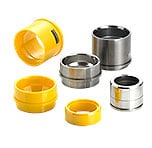
Necker Tooling Solutions
Necker tooling is essential for shaping the neck of a can during the necking process to create a flange that allows the lid to be sealed and prepare the can for seaming. Necker tooling includes necking dies and knock outs that are used in the final stages of can manufacturing.
Hyperion Materials & Technologies is a leading manufacturer of ceramic and cemented carbide necking dies, as well as steel knock outs used for can manufacturing. Hyperion offers a wide range of necker tool designs to meet the specific needs of each can maker and provides engineering support and technical services to help can makers optimize their necker tooling performance.
Product Groups
Type: Knock Out & Necking Die
Dimensions: as per drawing/requested
Description: Necker tooling manufactured to custom dimensions in accordance with agreed solution. Material, grades, and designs are tailored to each customer based on individual needs and requirements.

Type: Knock Out & Necking Die
Dimensions: as per drawing/requested
Description: Necker tooling manufactured to custom dimensions in accordance with agreed solution. Material, grades, and designs are tailored to each customer based on individual needs and requirements.

Ceramic Necking Dies
Ceramic necking dies are made of high-performance ceramic that offers greater durability and corrosion resistance than steel necking dies, providing increased lifespan for the necker tooling. Hyperion offers ceramic necking dies in yellow (standard), white, and brown ceramic.
Cemented Carbide Necking Dies
Cemented carbide necking dies are made of cemented tungsten carbide. Due to its hardness and wear-resistance, cemented carbide offers the can making industry a superior option to traditional steel necking dies. Cemented carbide can also reduce scrap rates and maintenance costs while improving safety and production rates.
Steel Knock Outs
Steel knock outs are made from hardened steel and are used in the necking stage of the can manufacturing process to create openings in the can body. Steel knockouts offer versatility and the ability to create openings with a high degree of accuracy and efficiency.
Ceramic Knock outs
Ceramic knock outs are made of a high-grade ceramic material providing improved corrosion resistance and tooling precision. Ceramic knockouts can last significantly longer than steel knockouts resulting in increased production rates and significant cost savings.
FAQs About Necker Tooling
Hyperion partners with LPS to provide necker tooling design and troubleshooting support to develop and enhance necker tooling designs and create processes to optimize line efficiencies and reduce spoilage.
Hyperion can connect you with our regional partners that can assist you with the recycling of cemented tungsten carbide necking dies. You can learn more about Hyperion’s Carbide Recycling Program by visiting our Carbide Recycling page or by contacting a Hyperion can tooling product specialist.
Steel knock-outs offer can makers greater toughness with a high degree of accuracy and efficiency. Ceramic knock-outs allow greater tooling precision and improved resistance to wear and corrosion. This improved wear resistance provides a longer lifespan for ceramic knock-outs, resulting in increased production rates and significant cost savings. Finally, ceramic knock-out are easier to clean because they can be caustically washed at the same time as the ceramic necking dies.
Hyperion necking dies are produced in either high-performance ceramic or cemented tungsten carbide. Ceramic necking dies are available in a few color options, including yellow, brown, and white ceramic. Tungsten carbide necking dies are available in grade H12N.
Hyperion’s can tooling product specialists are materials science and can tooling application experts who support can makers in selecting the best materials for their can manufacturing processes.
Hyperion has the capability to produce both ceramic, steel or carbide knock-outs. Hyperion product specialists support can makers in choosing the right material for knock-outs that fit their unique production specifications.